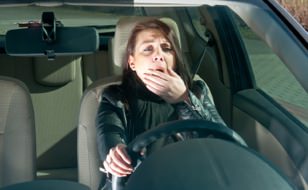Driver Fatigue
The Sleeping Killer
 We are all familiar with the rules of the road in terms of what is legal and illegal and hear all too often of fatal collisions or accidents on Irish roads due to drink driving or speeding. These, as we know, are both illegal to do on our roads but it is important to be aware of another highly dangerous driving activity which is not illegal; driving whilst tired.
We are all familiar with the rules of the road in terms of what is legal and illegal and hear all too often of fatal collisions or accidents on Irish roads due to drink driving or speeding. These, as we know, are both illegal to do on our roads but it is important to be aware of another highly dangerous driving activity which is not illegal; driving whilst tired.
Driver fatigue accounts for 1 in 5 road deaths in Ireland, although driving whilst tired is not illegal, it can cause the driver to have impaired vision and responses of that of someone under the influence of alcohol. Across Europe, over 4000 people die each year in driver fatigue related accidents*, so we take a look at the recommended advice on how to avoid this and when you could be at risk.
People who drive for a living such as truck or taxi drivers, people who work the night shift, skilled manual workers and men are at the highest risk of driver fatigue. Often they are working very long hours through the night and into the early morning at times when most of us should be sleeping. Driver fatigue collisions occur when our bodies are at a natural low and feeling tired which is usually between 2-6am and 3-6pm
Shockingly, driver fatigue related accidents are three times more likely to result in death as the driver is less aware of the impending collision to take evasive action. This is a shocking statistic, but unfortunately driver fatigue is a silent killer.
If find yourself behind the wheel and fighting tiredness, the Road Safety Authority offer some essential advice on what to do to help combat this and stay safe on the road.
To prepare yourself for driving no matter how long or short your journey is, ensure you have had adequate sleep, any medication you are taking whether it is prescription or over the counter to make sure that it does not cause drowsiness. There are a number of good quality products on the market for colds, flu and hay fever, which offer an anti-drowsiness version. If in doubt, always consult your GP or pharmacist.
Did you know, if you fall asleep at the wheel and cause an accident, you may find yourself ending up in a criminal court for prosecution or a civil court facing a claim from an angry third party.
The Road Safety Authority recommends that if you feel sleepy or struggling to keep your eyes open when driving, then you should find a safe place to pull in and stop (NOT on the side of a motorway on the hard shoulder!), drink two cups of strong coffee or a high stimulating caffeine drink, and take a rest for no longer than 15 minutes.
You may wonder what good is a 15 minute nap going to be when I'm tired?
The premise behind the short power nap to over come driver fatigue is that it's just long enough for the caffeine to kick in from the drinks you should consume in the event of tiredness, and the short nap is just long enough to allow your body to feel rejuvenated without falling into a deep sleep. If you sleep for longer and fall into a deep/proper sleep and fail to complete the sleep (i.e. wake up before your body tells you to) then you will suffer from something called sleep inertia which is when you wake up feeling groggy and potentially more tired than before.
Quick safety tip, remember to lock your doors before settling down for your nap!
The brief power nap can help improve alertness immediately after waking without the detrimental affect of sleep inertia. Many regular advocates of the power nap have worked out exactly how long suits them and their life style in order to wake up fully refreshed. However if you are worried about sleeping too long there are many apps that you can download for free or as little as €1 which you can use on your smartphone to help you have a restful snooze by playing noise cancelling tunes and sounds, then set your alarm off after the recommended 15 minutes ensuring you wake up gently and refreshed.
However, please note, if you are a professional driver or are planning a trip, it is advised that the above measures are used in emergencies only and should not be the consistent answer to driving whilst tired.
Many people will say that when they are tired they will stop, get out of the car and stretch their legs, open a window or turn the radio up. These measures only work for a very short period of time and do not offer an effective cure to fatigue.
Even when you are close to your destination, don't be fooled into thinking that you will be fine and make it without nodding off. Many incidents involving drivers falling asleep at the wheel occur when they are only minutes away from their destination. No amount of will power will stop you falling asleep, so it is important that you listen to your body and take a rest no matter how close to your destination you are.
Did you know that dehydration causes tiredness? As little as 2% water loss from your body can lead to reduced mental function and concentration.
*Source www.rsa.ie
